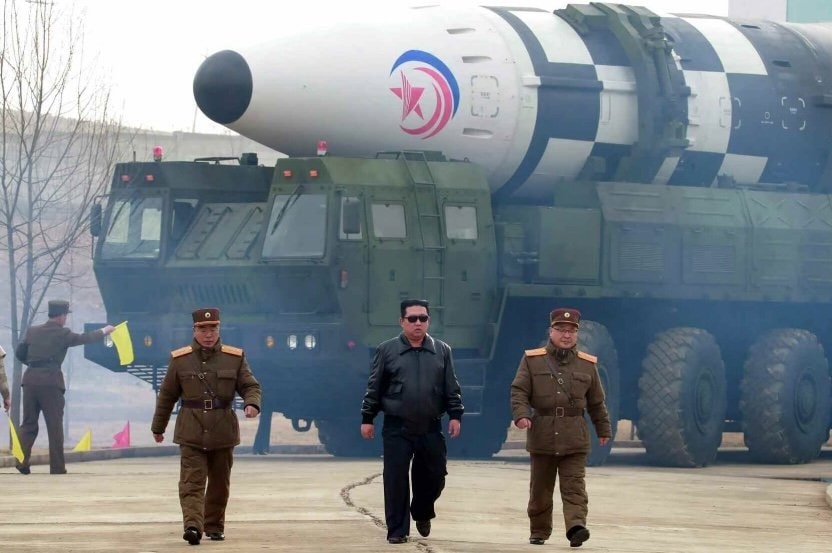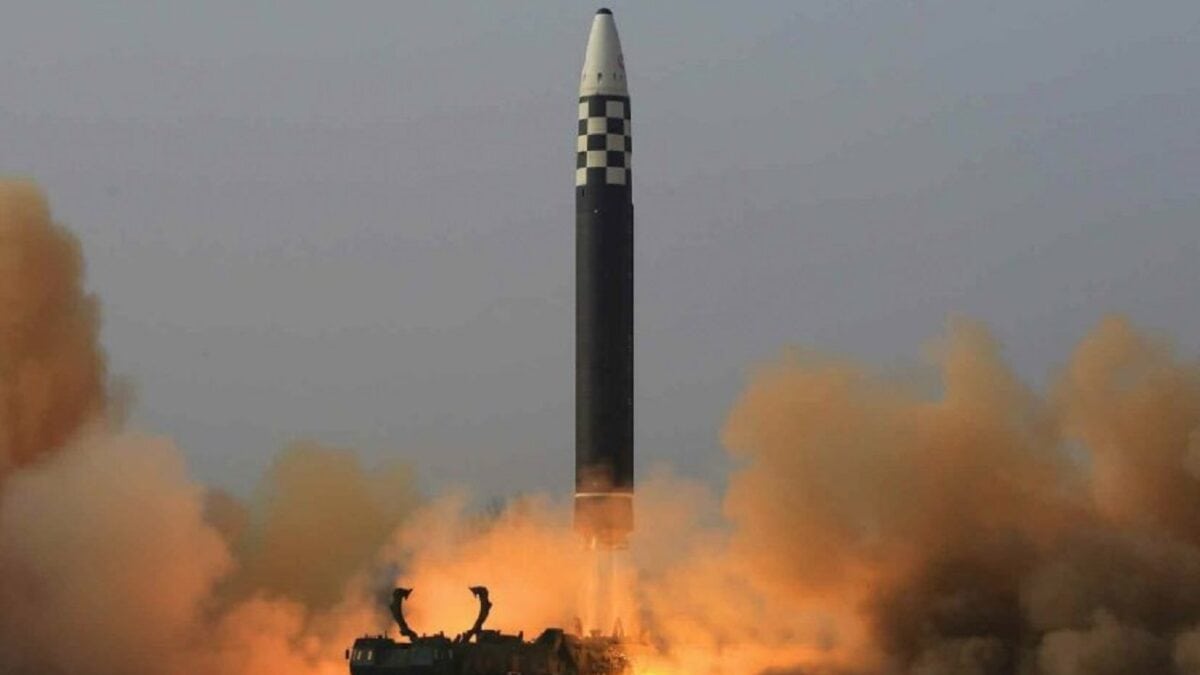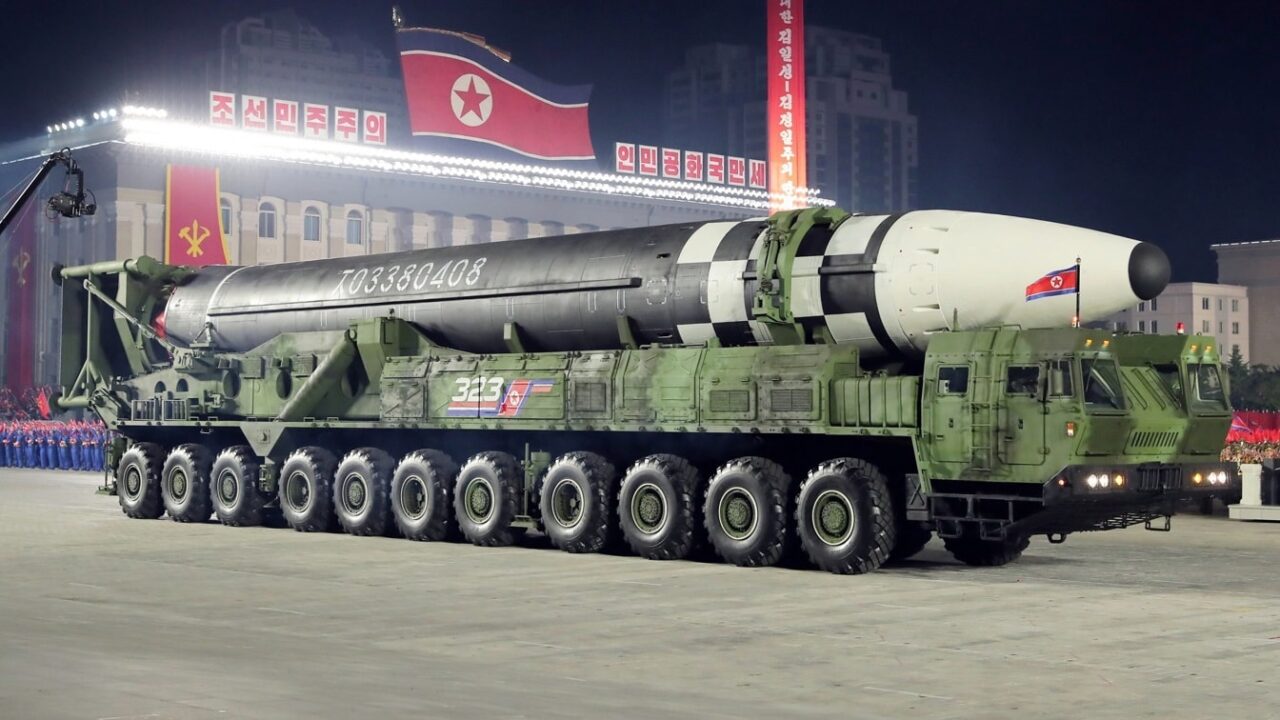North Korea’s ICBM Launch: Learning from Russia Keeping NATO out of Ukraine? – North Korea just tested a new intercontinental ballistic missile. It appears that this is Pyongyang’s longest-range missile yet. The goal, obviously, is to strike the United States if necessary. North Korea has sought, and now likely achieved, the ability to directly threaten the US mainland with substantial nuclear force.
ICBMs normally are designed to deliver a nuclear payload. North Korea first detonated a nuclear weapon in 2006. It is widely assumed that it now has several dozen nuclear warheads. North Korean supreme leader Kim Jong Un has also hinted that he wishes to develop MIRVs (multiple, independently-targetable re-entry vehicles). This would permit each ICBM to carry multiple warheads. So even if only one North Korean ICBM were to survive American missile defense, it could then still devastate multiple American cities.
Much of this is already known. The North Koreans unilaterally halted testing in 2018 as a part of the negotiations between Kim and US President Donald Trump. Those negotiations failed, and administration of US President Joseph Biden is more hawkish than Trump on North Korea. Similarly, the incoming South Korean president is more hawkish than his predecessor. The North may have figured it was time to re-start testing to re-confirm its capabilities and send a message that it can strike.
North Korea is not irrational or suicidal. Its elites do not wish to arbitrarily nuke the United States. Kim is not Osama bin Laden. Instead, Pyongyang’s nuclear weapons serve specific strategic purposes:
Military Equalization
The most obvious benefit is the leveling of the military playing field between North Korea, and the United States and South Korea. North Korea is very poor. Its economy is only around 30 billion USD. South Korea’s, by contrast, is 1.7 trillion USD, and South Korea’s defense spending alone is greater than North Korea’s entire GDP. And of course, the United States adds even greater weight to the South Korean side.
North Korea can never hope to catch up to the conventional force arrayed against it. Although it maintains a large military and forward deploys it near the South Korean capital, that military uses aging equipment and likely lacks spare parts, fuel, food, and so on. And it would be nearly defenseless against allied airpower in a sustained conflict.
Nuclear weapons, including the possible development of small, battlefield nuclear weapons, dramatically reduce the yawning conventional gap.
Deter the US
Nukes in conjunction with ICBMs also allow North Korea to directly deter the United States. Previously, North Korean deterrence relied on conventional striking power aimed at US allies – South Korea and Japan. And indeed, this stayed America’s hand in past crises. The US has never struck North Korea in a crisis, unlike its routine use of force in the greater Middle East. That is almost certainly because we fear North Korean artillery strikes on South Korea or short-range missile strikes on Japan.
But nuclear ICBMs are far more immediate. They establish direct deterrence with the US, in parallel to America’s direct deterrence of the North. Both countries now have the ability to strike the other’s mainland. The US would do far more damage. America is also a large country that would likely still function even after a few nuclear strikes. And the US has missile defense which might shoot down some North Korea missiles. But still, the ability of North Korea to hit the US mainland almost certainly means that the US will never preemptively strike North Korea as Trump hinted at in 2017, and US President Bill Clinton before him in 1994. That window has now closed for good.
Keep the Americans at Bay in a Future Korean Conflict
Finally, North Korean nuclear ICBMs increase the likelihood that the US will not intervene in a Korean contingency for fear of North Korean nuclear retaliation. We see this behavior in Ukraine today. Russian President Vladimir Putin has successfully leveraged his nuclear weapons to keep NATO at bay during his war. NATO airpower could help the Ukrainians substantially. Indeed, it would likely help the Ukrainians win the win, which is why Ukrainian President Volodymyr Zelensky keeps asking for a no-fly zone.
But NATO has hesitated, rightfully, because it fears that a no-fly zone could escalate into a shooting war with Russia, which might prompt Putin to use nuclear weapons in desperation. Putin has in fact hinted at exactly that scenario. This has stayed America’s hand, and Kim Jong Un is probably learning that lesson too.

North Korea wheeling out new Hwasong-17 ICBM. Image Credit: DPRK State Media.

North Korea ICBM. Image Credit: DPRK State Media.
If North Korea can frighten the Americans into staying out of Korean affairs, the likelihood of a favorable North Korean outcome improves dramatically. Nuclear weapons could be cover for North Korea to bully South Korea into submission – perhaps subsidizing North Korea indefinitely through an inter-Korean federation. Nukes might even block American intervention in a direct inter-Korean conflict, as it happening now in Ukraine. If North Korea were to use low-yield nuclear weapons on the battlefield against South Korean conventional superiority, while simultaneously keeping the Americans at bay with the threat of US mainland retaliation, Pyongyang might actually win a second Korean war.
As always, our options are terrible. We should continue to fund missile defense. It does not work very well, but we are desperate and even if we can only shoot down a few North Korean missiles, that is a few nuclear strikes we can avoid. We should also talk to North Korea, but in a far more serious manner than Trump’s vainglorious showboating. And at some point, the US might need to reconfigure its base presence in South Korea to be less vulnerable to North Korean missile strike hostage-takings.
Dr. Robert E. Kelly (@Robert_E_Kelly; website) is a professor of international relations in the Department of Political Science at Pusan National University. Dr. Kelly is a 1945 Contributing Editor as well.

